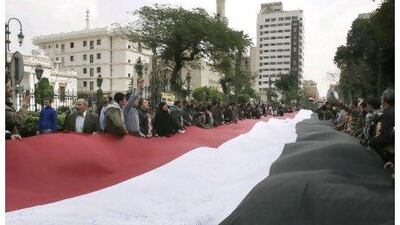Thousands of workers went on strike yesterday as two weeks of protest began to take a toll on Egypt's fragile economy.
There were reports of industrial action and unrest from Aswan and Luxor in the south to Mahalla and Quesna in the north, and the main industry body said industrial production had dropped by 80 per cent since the protests began.
About 6,000 workers at five service companies owned by the Suez Canal Authority began a sit-in strike on Tuesday night. There was no immediate disruption to shipping in the canal, a vital international waterway from the Mediterranean to the Red Sea.
The protesters yesterday defied a warning by Omar Suleiman, the Egyptian vice-president, that they should "end the crisis". Instead they gathered for a 16th day of demonstrations in which roads to the parliament building near Tahrir Square were blocked off.
Mr Suleiman said on Tuesday night that continued demonstrations were "very dangerous" and that the crisis had to end. "We don't want to deal with Egyptian society with police tools," he said.
If dialogue with the opposition failed the alternative was "that a coup happens, which would mean uncalculated and hasty steps, including lots of irrationalities", Mr Suleiman said.
The foreign minister, Ahmed Abul Gheit, was more direct yesterday. He said the army would be forced to intervene if protests pushed the country into chaos.
Opposition figures rejected the remarks as an attempt at intimidation. Essam el Erian, a Muslim Brotherhood leader, said the opposition was giving Hosni Mubarak, the Egyptian president, a week to step down. "They need some time. We give them this chance. A week," he said.
The economic effects of the protests included "transportation difficulties from ports or to sale and distribution centres, lower market demand for non-food products, and funding problems", the ministry of trade and industry said in a statement attributed to Galal el Zorba, the chairman of the Federation of Egyptian Industries (FEI).
The comments followed a meeting between the FEI and the Egyptian trade and industry minister, Samiha Fawzy, at which business leaders pledged not to lay off workers at 70,000 industrial facilities in Egypt and to pay their wages "no matter what the circumstances".
Egyptian factories would return to full production capacity "as soon as possible", the statement said. Egypt's industries include steel, chemicals, textiles and construction. Industrial production is estimated to account for about a third of Egypt's GDP.
Egyptian industrialists also appealed to the government and the media "not to tarnish the reputation of the honourable industrialists of Egypt so that the local and foreign confidence in this sector may not be shaken", according to the statement.
The role of industrialists in Egypt's rapidly evolving political landscape has been uncertain. Dozens of industry leaders took government positions under Mr Mubarak, a move seen by many Egyptians as evidence of a creeping plutocracy.
The management of Egypt's economy will possibly be the most pressing issue during any political transition.
Economists have already indicated they will cut GDP growth forecasts this year, and major credit ratings agencies have downgraded the country's currency. In its most recent global growth outlook, the IMF said the Egyptian economy was expected to expand by 5.5 per cent.
Tim Fox, the chief economist at Emirates NBD, said the lasting economic impact of reduced industrial production would depend on how long the standstill lasts.
In economic terms, he said, it could be seen as similar to catastrophic weather, such as the recent winter storms in the UK or Australia's floods and cyclones. In such situations, he said, production tends to rebound rapidly once it restarts.
The problem with Egypt, he said, is that "nobody really knows" how quickly the political situation will stabilise.
Mr Suleiman's warnings to Egyptian demonstrators, meanwhile, met a sharp rebuke in Washington on Tuesday. Robert Gibbs, the White House spokesman, said the Egyptian vice-president had "made some particularly unhelpful comments about Egypt not being ready for democracy, about not seeing a lift of the emergency law".
Joe Biden, the US vice-president, later called Mr Suleiman to reiterate that the US supported an "orderly" transition in Egypt that was "prompt, meaningful, peaceful and legitimate".
The firmer tone came after the administration over the weekend had signalled it would support a slower transition under Mr Suleiman.
On Sunday, Hillary Clinton, the US secretary of state, indicated that the immediate ousting of Mr Mubarak could complicate a transition to democracy rather than ease it.
But Mrs Clinton's remarks, in turn, came only days after Barack Obama, the US president, had called for immediate change, and the conflicting statements from the administration seem to ebb and flow with the swell of demonstrators on the streets of Egypt.
Steven Cook of the Council on Foreign Relations said: "The administration is trying to position itself in a way that minimises damage to the US regardless of the outcome here.
"It seems like it is splitting the difference and that doesn't seem like it is satisfying anybody."
The administration has reportedly been under pressure from allies in the region, not least Egypt's immediate neighbours, Israel, Jordan and Saudi Arabia, to tone down its calls for immediate transition, fearing that the unrest will continue to spread.
William Hague, the British foreign minister, on a whirlwind tour of the region specifically to address the turmoil, warned that the Palestinian-Israeli peace process was in danger of becoming a "casualty of uncertainty".
Mr Hague urged Benjamin Netanyahu, the Israeli prime minister, to tone down his increasingly belligerent rhetoric in which he has urged Israelis to prepare for "any outcome".
Mr Hague also called on the US to set a firm timetable for the peace process, something the White House has so far resisted, even as the process has floundered.

